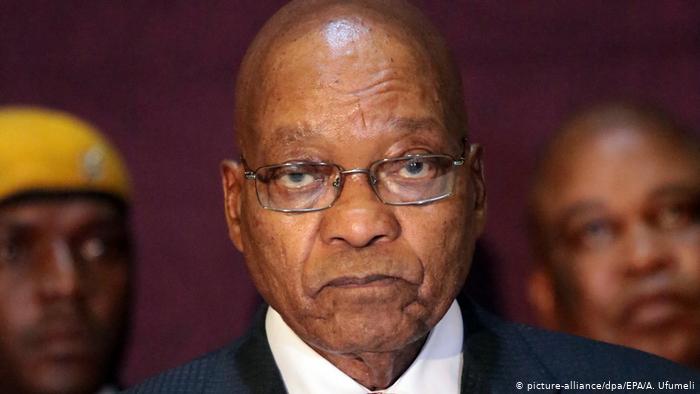South Africa’s highest court on Tuesday ordered the imprisonment of Jacob Zuma, the previous president of South Africa, for 15 months on contempt charges, after he defied an order to seem earlier than a corruption inquiry analyzing the breathtaking financial scandals that tainted his tenure because the country’s leader from 2009 to 2018.
The transfer to detain Mr. Zuma, a comrade of Nelson Mandela and one of many dominant figures within the governing African National Congress get together since apartheid led to 1994, was a notable development within the legacy of corruption that shadowed his years in power. Mr. Zuma was not in court on Tuesday, and he was not instantly taken into custody.
The choice by the Constitutional Court to have Mr. Zuma arrested got here 5 months after that very same body ordered him to seem earlier than the corruption inquiry, led by Deputy Chief Justice Raymond Zondo.
However Mr. Zuma overtly defied the court. Not only did he fail to indicate as much as testify earlier than the inquiry, however he additionally ignored the high court’s contempt proceedings, declining to a lot as mount a defense.
The call to imprison Mr. Zuma for his defiance comes at a time when many fed-up South Africans appear to have coalesced behind the efforts of the current president, Cyril Ramaphosa, to root out corruption within the government and the A.N.C. get together.
The looting of public enterprises by government officers has taken a heavy toll on the lives of atypical residents, felt in problems just like the shoddy supply of services, frequent power outages and water shortages. Annoyed South Africans are protesting on a frequent basis.
Mr. Zuma, 79, has in many methods turn into essentially the most potent illustration of government management gone astray.
In a bid to regain public confidence, the current president, Mr. Ramaphosa, has in latest months gone after a few of his personal get together’s main figures — together with the health minister, in the course of a pandemic, and the A.N.C. secretary-general, the third strongest member of the get together — who’ve been accused of corruption, forcing them to step except for their roles throughout the A.N.C. whereas they face charges.
It was a decisive transfer that many South Africans have said was lengthy overdue. But it surely additionally has prompted a cut up throughout the get together. Though Mr. Ramaphosa seems to have the help of a majority of the A.N.C., there stays a robust core of Zuma loyalists.
Tuesday’s determination was introduced in a sparsely populated courtroom in Johannesburg, with attendance limited due to rising coronavirus infections within the country. Justice Sisi Khampepe sat on a curved dais earlier than a backdrop of the South African flag and a crimson brick wall, methodically studying the court’s determination. She spent a number of minutes reviewing the history of the case earlier than asserting Mr. Zuma’s destiny.
Mr. Zuma himself started the corruption inquiry he has since shunned. Began in 2018, it got here after a report detailing the extent of corruption in state-owned companies and government departments throughout his administration. In its far-reaching mandate, the commission has interrogated more than 250 witnesses.
Mr. Zuma is the primary to refuse to testify. He has argued that he’s not legally obliged to do so, saying Justice Zondo harbors a personal vendetta in opposition to him. The choose has dismissed the argument as baseless.
Past the commission’s inquiry, Mr. Zuma faces further critical legal troubles associated to corruption allegations.
He’s being prosecuted on charges of racketeering, corruption, fraud and cash laundering after being accused of taking bribes from a French arms producer when he was deputy president in 1999. That trial was set to begin earlier this yr, however the case has been delayed repeatedly. Most just lately, Mr. Zuma’s legal team has sought to get the lead prosecutor eliminated, alleging that he was biased. The case has been postponed till July.
Whereas Mr. Zuma is a polarizing determine in South Africa, he retains appreciable help, elevating the danger of protests by sympathizers and supporters.
Mr. Ramaphosa, previously Mr. Zuma’s deputy, gained the A.N.C. management in 2017 after a bruising inside battle. Quickly afterward, he forced Mr. Zuma to step down as president, a humiliating defeat that Mr. Zuma has not forgiven.
Mr. Ramaphosa’s vow to root out corruption and patronage throughout the A.N.C. has confronted robust resistance from a rival faction throughout the get together. The A.N.C. has dominated South African politics because the end of the apartheid period.
Mr. Zuma’s critics anxious that his refusal to testify would severely undercut the corruption inquiry and additional alienate South Africans weary of what they see because the impunity and lack of accountability for high-ranking A.N.C. politicians.


